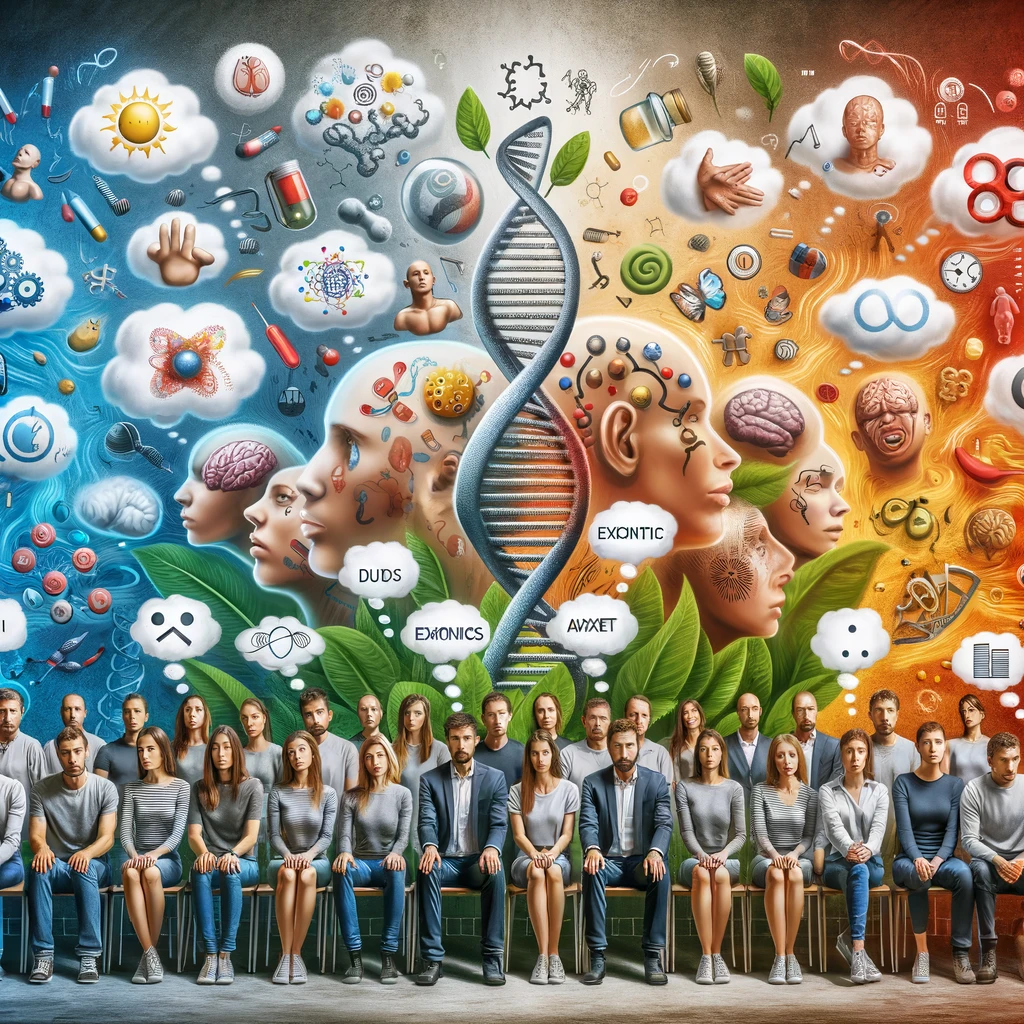The topic of how various factors such as people’s characterizations, born preferences, epigenetics, mindset, and mental health interact and influence one another is a complex and multifaceted subject. Let’s break down these components to better understand their interplay:
1. People’s Characterizations: This refers to the way individuals are perceived or described based on their behavior, personality, and other observable traits. These characterizations can be shaped by a combination of genetic predispositions, environmental influences, and personal experiences. How we characterize people can also be influenced by societal norms and cultural backgrounds.
2. Born Preferences: These are the innate tendencies or inclinations that a person may have from birth. While the debate of nature vs. nurture is ongoing, it’s widely accepted that certain preferences, such as temperament, can be genetically predisposed. However, the environment in which a person grows up plays a significant role in how these preferences are expressed and developed.
3. Epigenetics: Epigenetics is the study of how your behaviors and environment can cause changes that affect the way your genes work. Unlike genetic changes, epigenetic changes are reversible and do not change your DNA sequence, but they can change how your body reads a DNA sequence. Epigenetic changes can be influenced by several factors, including lifestyle, diet, and stress. These changes can have a significant impact on a person’s health and behavior.
4. Mindset: The concept of mindset refers to the collection of beliefs and attitudes that shape how an individual interprets and responds to various situations. A person’s mindset can greatly influence their behavior, learning potential, and how they handle challenges. Mindsets can be shaped by upbringing, experiences, and education, and they can be a key factor in a person’s overall mental health and well-being.
5. Mental Health: Mental health encompasses emotional, psychological, and social well-being. It affects how we think, feel, and act. Mental health is influenced by a variety of factors, including genetics, brain chemistry, personality, and life experiences. Good mental health is essential for an individual’s overall health and can be maintained or improved through practices like therapy, medication, and lifestyle changes.
The interplay between these factors is dynamic and complex. For example, a person’s born preferences might predispose them to certain behaviors, but their mindset and the environment can modify how these preferences are expressed. Epigenetic changes can occur in response to environmental stressors or lifestyle choices, which in turn can impact mental health. Similarly, an individual’s mental health can influence their mindset and behaviors, potentially leading to changes in how they are characterized by others.
What is more important? – Born preferences or personal growth?
This discussion highlights the importance of considering the holistic nature of human development and behavior. It suggests that no single factor can fully explain a person’s character or choices, and that a comprehensive approach is necessary to understand and support individual well-being.
The question of whether born preferences (innate traits and tendencies) or the ability to change oneself (adaptability and personal growth) is more important is complex and does not have a straightforward answer. Both play crucial roles in shaping an individual’s life, and their relative importance can vary greatly depending on the context. Let’s explore both aspects:
Born Preferences (Innate Traits and Tendencies):
– Role in Development: Innate traits such as temperament, natural talents, and predispositions can significantly influence early development and can shape a person’s initial path in life.
– Influence on Personality: Certain aspects of personality are thought to be innate and can affect how an individual interacts with the world.
– Genetic Factors: Genetics can predispose individuals to certain behaviors, health conditions, and even preferences, which can have a profound impact on life choices and experiences.
2. **Ability to Change Oneself (Adaptability and Personal Growth)**:
– Overcoming Limitations: The ability to change allows individuals to overcome limitations imposed by their innate traits or environmental circumstances.
– Lifelong Learning: This ability emphasizes the importance of personal development, learning, and adaptation throughout life.
– Response to Environment: Adaptability enables individuals to respond effectively to changing environments, challenges, and opportunities.
– Mental Health and Resilience: The capacity for change is closely linked to mental health and resilience, empowering individuals to cope with adversity and grow from their experiences.
In reality, the interplay between born preferences and the ability to change is often what shapes a person’s life. Innate traits provide a starting point, but adaptability and personal growth determine how those traits are developed, managed, or even altered over time.
Natural talent vs. resilience & discipline
For instance, someone may be born with a natural talent for music but may need to cultivate discipline and resilience to fully realize their potential. Conversely, an individual might have certain limitations or challenges but can use their adaptability and learning ability to overcome these hurdles and achieve success.
In different contexts, the importance of each factor can vary. For example, in a rapidly changing technological world, adaptability and continuous learning might be more valued. In contrast, in a field that highly values specific innate talents (like certain sports or arts), born preferences might play a more significant role.
Ultimately, both born preferences and the ability to change oneself are important, and their relevance can be context-dependent, highlighting the multifaceted nature of human development and success.










